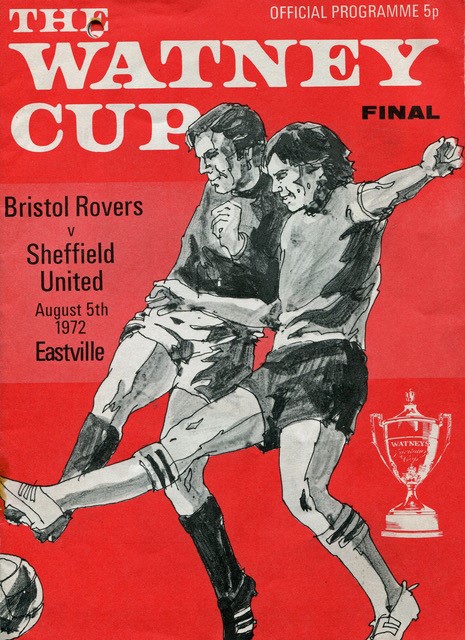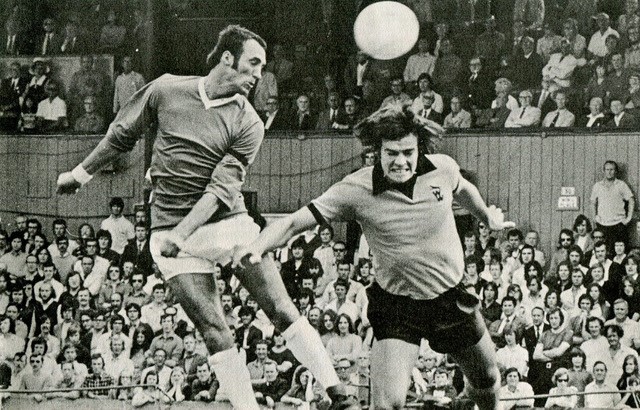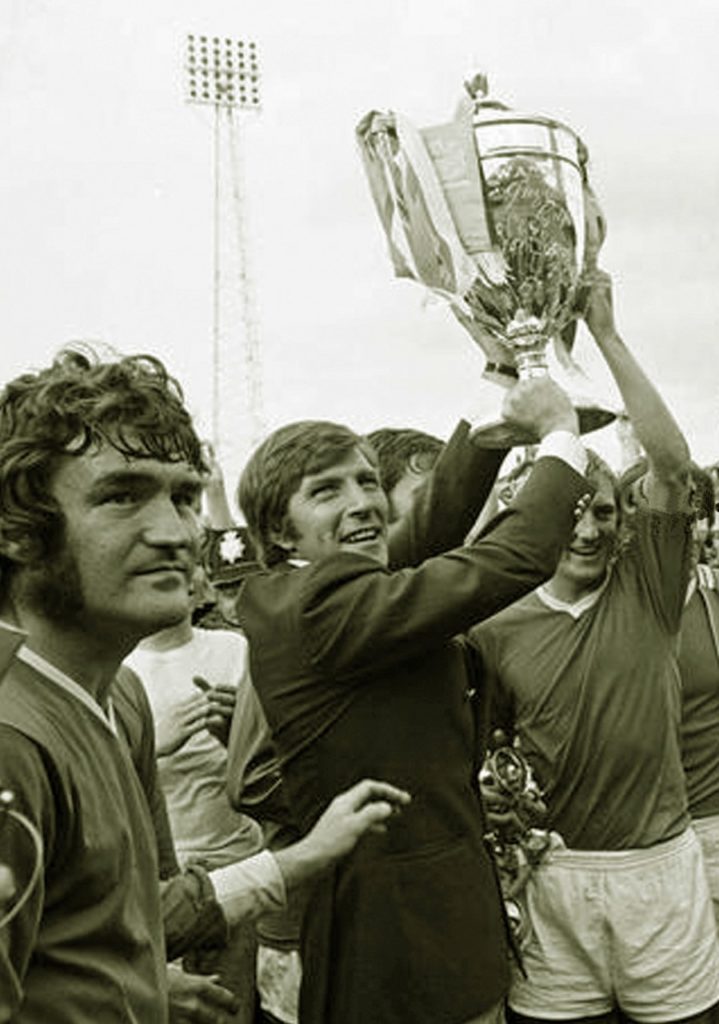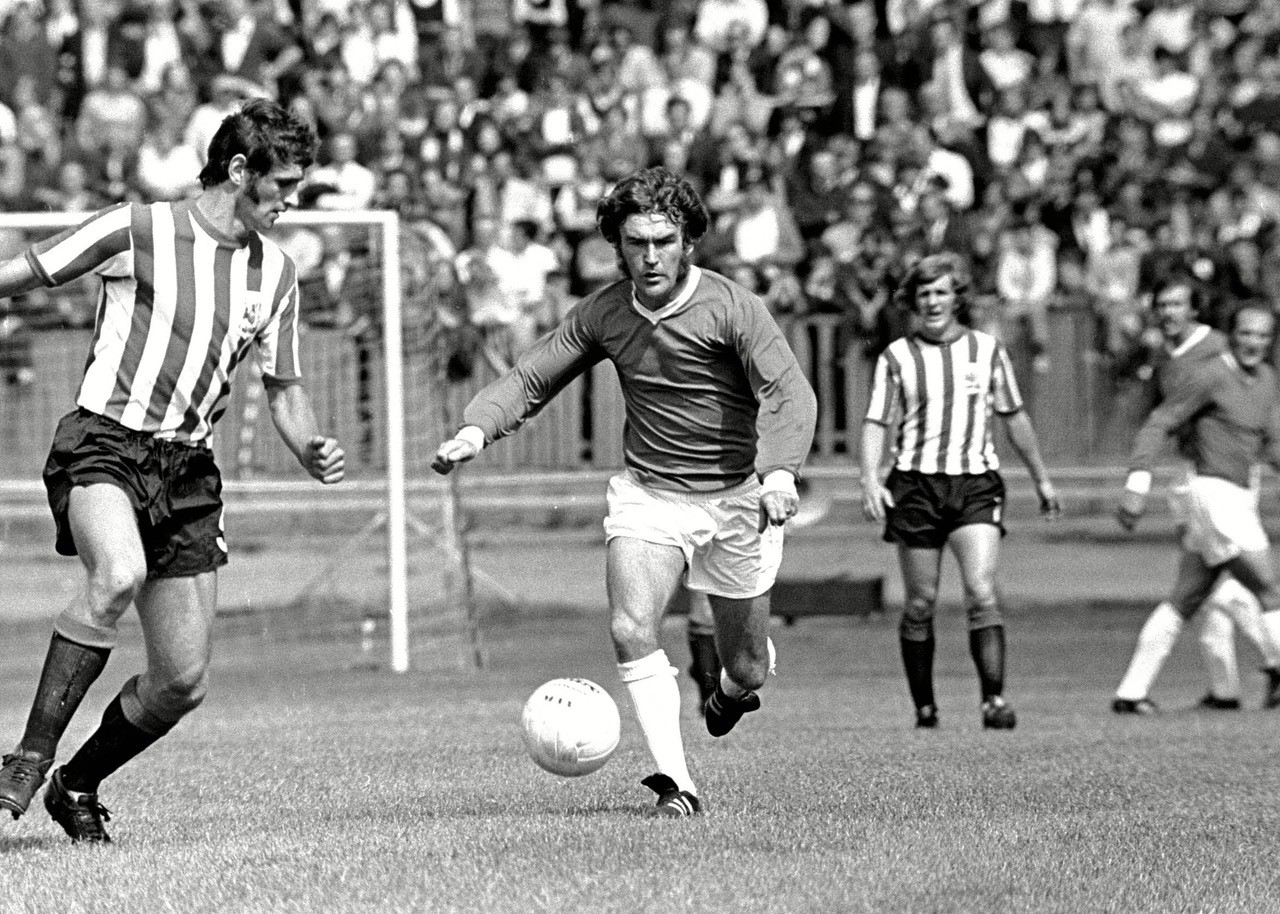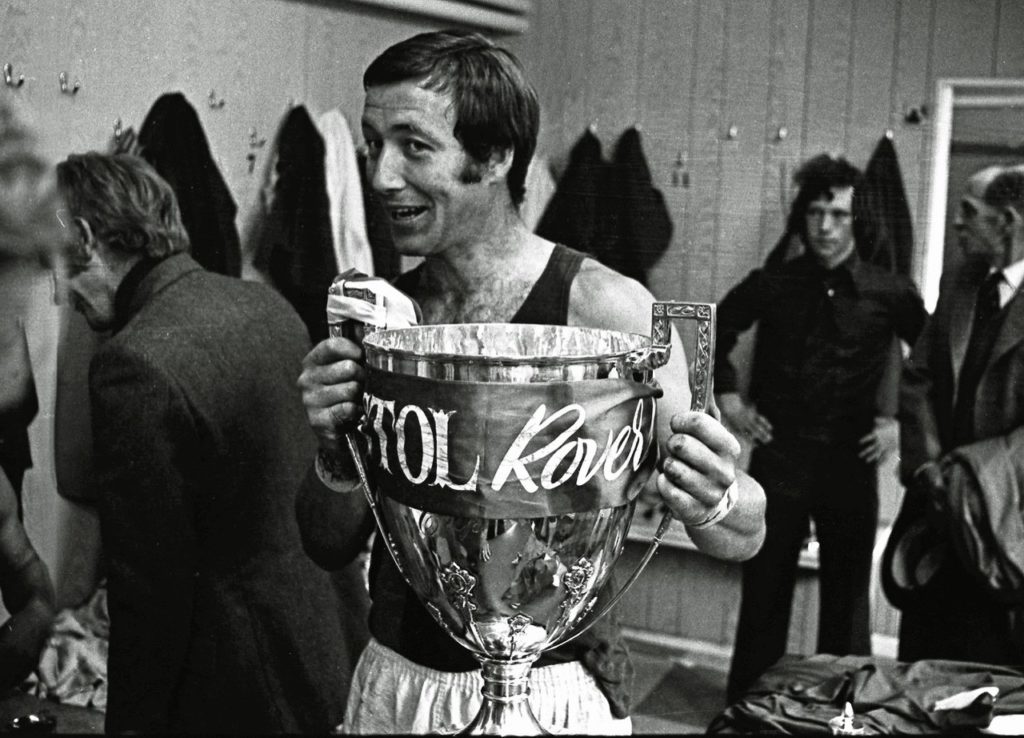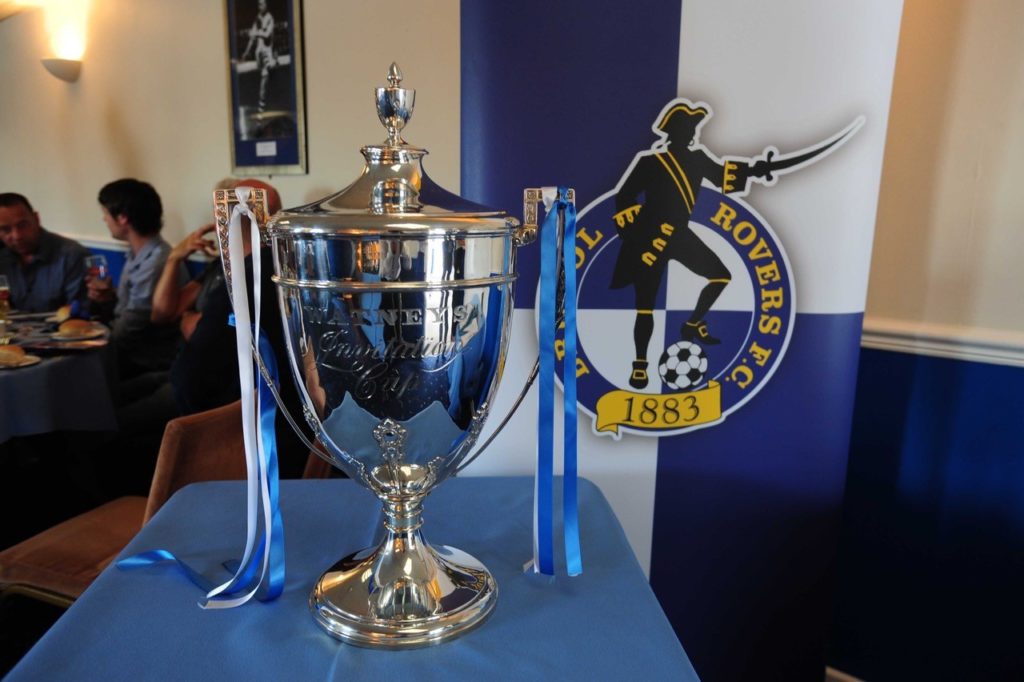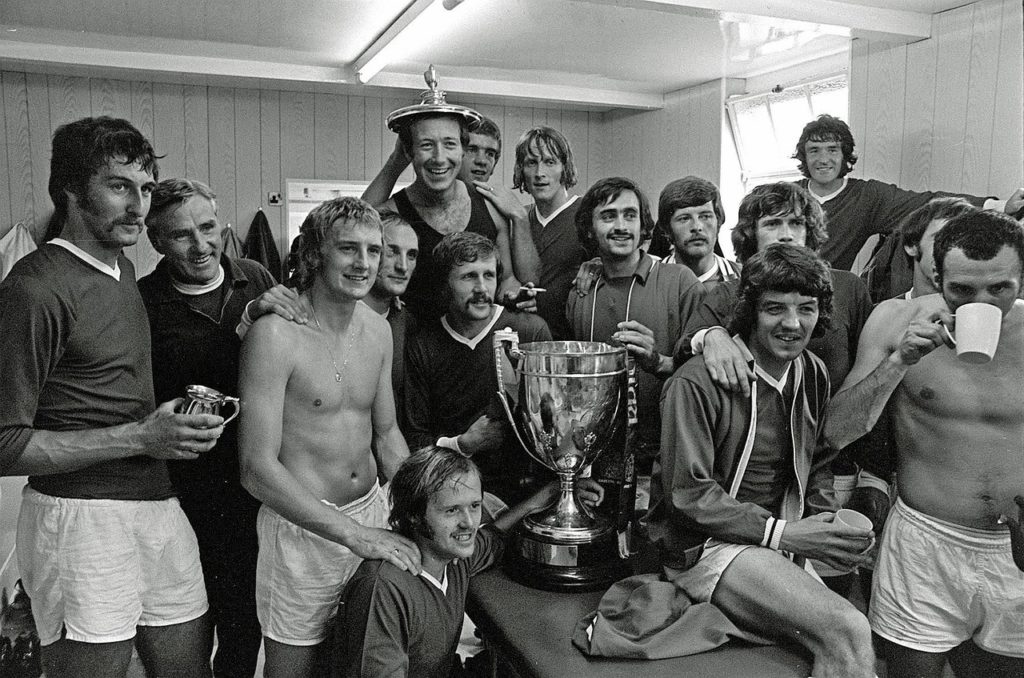The Watney Cup
Golden Anniversary
By Keith Brookman
By the time Neil Diamond had recorded his album ‘Hot August Night’ in 1972 Bristol Rovers had already celebrated a ‘Hot August Day’ by winning a major cup competition, namely the Watney Cup.
As we celebrate the Golden Anniversary of that win, on 5th August 1972, we look back at a short lived competition which many younger supporters will know very little about.
The competition ran for just four seasons, from 1970, and was sponsored by the Watney Mann Brewery thus becoming the first ever domestic cup competition to bear the name of a sponsor.
The pre-season tournament was open to eight teams, two from each of the four divisions who had scored the most goals in the previous season and who had not been promoted or qualified for European football.
The first winners of the competition were Derby County, who beat Manchester United in the final. Colchester United were winners in 1971 as they overcame West Bromwich Albion in the final.
And then it was the turn of Third Division Rovers who qualified by virtue of the fact that they had scored 75 goals the previous season and finished in sixth place in the league standings.
The First Division representatives were Sheffield United and Wolverhampton Wanderers, while Blackpool and Burnley represented the Second Division, Rovers and Notts County the Third Division and Lincoln City and Peterborough United the Fourth Division.
Rovers were in a group of four along with Wolves, Burnley and Lincoln City and were drawn to play Wolves, at Eastville, on 29th July 1972.
Ahead of that game skipper Brian Godfrey said; ‘Whatever the result, we just can’t lose. There couldn’t be a better way in which to build us up for the Third Division.
‘The game against Wolves is a good one for the club. It’s good for the supporters who will see a hard fought cup tie instead of just an ordinary friendly and, more importantly, it’s good for the players.
‘If we win the match it will give us a marvellous tonic and boost for the League programme. If we lose, we’ll have had the benefit of a really tough match to get us in trim to win promotion and it will be a great experience for the lads.’
As it turned out, Rovers ran out 2-0 winners in front of a crowd of 12,489, thanks to goals from Frankie Prince and Bruce Bannister.
It was Rovers’ first game under newly appointed manager Don Megson and they took a first half lead from the penalty spot on 26 minutes.
Kenny Stephens was tripped by defender Frank Munro and Bruce Bannister confidently stroked his spot kick low to the left of goalkeeper Phil Parkes (not to be confused with the former QPR/West Ham goalkeeper of the same name!).
The second goal arrived two minutes from time when Stephens lashed home a right foot volley following a Brian Godfrey corner.
A delighted Megson said afterwards; ‘We played as if we’ve got the right attitude to win something this season. I was so pleased with the lads as they all played so well.’
Rovers: Sheppard, Roberts, Parsons, Green, Taylor, Prince, Stephens, Jones (W), Allan, Bannister, Godfrey.
Burnley were 1-0 winners against Lincoln City, at Sincil Bank, on the same day and they were drawn at home against Rovers in the semi final. That game was played on 2nd August and Rovers again ran out 2-0 winners, to make it through to the final.
Manager Megson named an unchanged side for the game at Turf Moor, where a crowd of 10,589 saw Frankie Prince give Rovers a 15th minute lead when he latched on to Bannister’s reverse pass before hitting a well placed left foot shot beyond the reach of home goalkeeper Alan Stevenson.
Bannister wrapped things up for Rovers four minutes into the second half after Stevenson had only managed to parry a shot from Stephens straight to him and the striker was on hand to knock the ball into the net.
Once again Megson couldn’t fault his players, saying; ‘What more could I ask from the lads than that? It was a harder tie to win than last Saturday because Burnley put more into their game than Wolves did.
‘But we proved ourselves the better side. With this kind of performance we can cause problems for any team in the league.’
On the same evening Sheffield United, who had beaten Notts County 3-0 in their opening game, were 4-0 winners against Peterborough United (who had beaten Blackpool 7-6 on penalties in their first round tie) and won through to face Rovers in the final of the competition.
And so, on that ‘Hot August Day’ referred to in the opening paragraph, The Pirates met The Blades at Eastville, in a game watched by a crowd of 19,380.
Referee, Mr ED Wallace from Swindon, had to wait for the match ball to be delivered by a member of the Army’s Red Devils freefall parachute team and only after he had ‘dropped in’ could the game get under way.
For the third successive match Megson named an unchanged side, though Bryn Jones did get a taste of the action when he replaced Prince in the 85th minute.
Rovers and United had reached the final of the competition without conceding a goal and that record remained intact for both sides, as it was 0-0 at the end of the 90 minutes.
United goalkeeper Tom McCalister, who later in his career spent a short time on loan at Rovers, made three superb saves during the game, from Godfrey and Bannister (twice) while United’s best chance came from Alan Woodward, who saw his second half strike turned over the bar by Dick Sheppard.
No extra time was played and so the winner was decided by a penalty shootout, in which Sheppard proved to be Rovers’ hero.
Phil Roberts, Godfrey, Bannister, Mike Green and Sandy Allan all converted their penalties but they were matched by five successful spot kicks by United players Keith Eddy, Tony Currie, Bill Dearden, Eddy Colquhoun and Woodward.
Lindsay Parsons made it 6-5 to Rovers but Stewart Scullion drew United level again before substitute Bryn Jones edged Rovers back in front. Next up for The Blades was Ted Hemsley but Sheppard pulled off a dramatic save to deny him and Rovers had won the cup!
Once again Megson was interviewed after the game and he said; ‘I thought we had a great chance of carrying off the cup when the match had to be decided by penalties.
‘We practiced hard all week taking them, including that long walk from the middle to the penalty spot, which I regarded as a psychological part of our preparation.
‘It paid handsome dividends as we took our kicks much more efficiently and without any show of nerves,’
Last word, though, went to goalkeeper Sheppard who said of his decisive penalty save; ‘I had noticed Hemsley was a right footed player and they usually hit penalties to the keeper’s left.
‘My tactics were to get as far across the line as possible to the side I thought the ball would go. I knew that Woodward would shoot to my left and that Colquhoun would probably blast his straight. For the rest I just dived what I thought would be the right way and hoped.
‘With Hemsley’s kick, it worked. The funny thing is that I was better on my right side than on my left which is where Hemsley placed his kick.’
Megson and his side were unable to complete a lap of honour of the Eastville pitch, as fans rushed on to lift the players shoulder high. Eventually Megson’s marvels were able to collect the magnificent Trophy, and their own individual mementos from Sir Roger Bannister (more of him in another Watney Cup article) before retiring to the dressing room to partake of some liquid refreshment!

